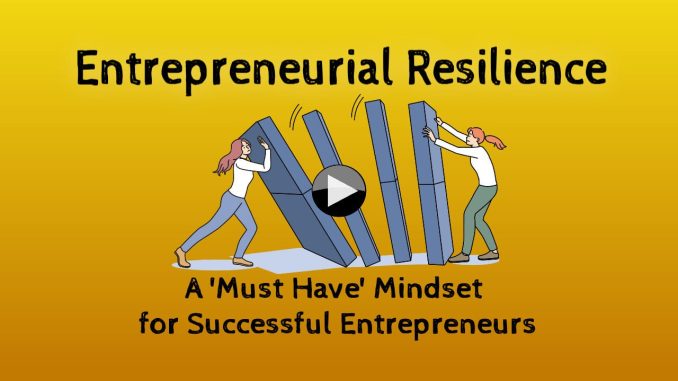
Entrepreneurship is often romanticized as a thrilling journey of innovation, independence, and success. While those elements certainly exist, the reality is often more turbulent than glamorous. Entrepreneurs face constant pressure, uncertainty, and setbacks—whether from shifting market conditions, failed product launches, financial strain, or personal sacrifices. What separates those who thrive from those who give up is not just talent or vision, but resilience. Cultivating entrepreneurial resilience is not a one-time effort; it’s an ongoing process of mental fortitude, adaptability, and emotional awareness that allows individuals to recover from setbacks and stay the course when things don’t go as planned.
Resilience starts with a mindset that acknowledges failure not as an end, but as a step in the journey. Many successful business owners have faced early defeats or long periods of stagnation. What sustained them was their ability to reframe those challenges as learning experiences. This doesn’t mean ignoring the frustration or disappointment that comes with failure. It means accepting it, analyzing it, and using it to refine strategies moving forward. For instance, an entrepreneur who launches a product that flops can either internalize the failure or study what went wrong—perhaps the timing was off, the messaging didn’t resonate, or the market need wasn’t there. A resilient mindset focuses on the lessons rather than the loss.
Building this kind of resilience often requires getting comfortable with discomfort. Entrepreneurs frequently operate in uncertain environments, where clear answers are rare and stakes are high. This ambiguity can be paralyzing if you expect everything to go according to plan. Resilient entrepreneurs, on the other hand, develop the ability to take action without having all the answers. They make the best decisions they can with the information available, stay flexible, and pivot when necessary. That willingness to move forward amid uncertainty is a crucial skill that can be honed over time.
Another key component of resilience is managing emotional energy. Starting and running a business can be emotionally exhausting. There are moments of elation, yes, but also long stretches of stress, self-doubt, and solitude. Maintaining emotional health in the face of these challenges is essential. Entrepreneurs who cultivate self-awareness and emotional intelligence are better equipped to handle the ups and downs. They recognize when they’re burning out, when fear is clouding their judgment, or when they need to step back and gain perspective. This kind of internal regulation enables them to remain grounded even when circumstances are chaotic.
Support systems also play a significant role in building resilience. Entrepreneurship can be isolating, but resilient entrepreneurs rarely go it alone. They seek mentorship, build strong professional networks, and maintain personal relationships that offer encouragement and perspective. Talking to someone who’s been through similar experiences or who simply listens without judgment can be incredibly stabilizing. These connections offer not just emotional support but also practical insights that can help navigate challenges more effectively. The ability to reach out, ask for help, and collaborate is not a sign of weakness—it’s a strength that fosters long-term endurance.
A commitment to purpose is another sustaining force. Entrepreneurs who are deeply connected to the mission behind their work are more likely to persevere through setbacks. When challenges arise—and they inevitably will—a clear sense of purpose serves as a compass. It reminds you why you started in the first place and reinforces the importance of continuing. This doesn’t mean blind devotion to a single idea; sometimes the path must change. But when the underlying motivation is authentic and compelling, it becomes easier to endure the tough times and stay focused on the bigger picture.
Practical habits also contribute to resilience. Developing a routine that includes moments of rest, reflection, and renewal helps maintain mental clarity. Resilient entrepreneurs often carve out time to step back from the daily grind to evaluate progress, reconsider goals, and ensure they’re not just reacting to problems but leading with intention. These pauses can prevent burnout and create space for strategic thinking. Regular exercise, proper sleep, healthy eating, and mindfulness practices might seem unrelated to business at first glance, but they directly impact one’s ability to remain resilient under pressure.
Resilience also involves accepting the limits of control. Entrepreneurs are naturally driven, often believing that hard work and smart decisions will yield success. While effort and intelligence matter, many external factors remain outside one’s control—economic downturns, global crises, changes in consumer behavior. Resilient individuals acknowledge these realities without becoming defeated by them. They focus on what they can influence, adapt quickly to changes, and avoid dwelling on circumstances they can’t change. This ability to shift focus from the uncontrollable to the actionable is a hallmark of mental strength in entrepreneurship.
It’s also important to understand that resilience isn’t static. It grows through experience. Each challenge, each failure, each win—even the small ones—contributes to your capacity to withstand and grow from adversity. Over time, you develop a track record that shows you can bounce back. That history becomes a source of confidence. You start to trust not only your ability to succeed, but your ability to recover, recalibrate, and keep going when things don’t go as expected. That’s the real power of resilience—it doesn’t guarantee a smooth road, but it ensures you’ll keep traveling it.
In business, as in life, setbacks are inevitable. The market will shift, competitors will emerge, and not every plan will unfold the way you hoped. But with resilience, those moments become chapters in a longer, more rewarding story. Cultivating entrepreneurial resilience means building the internal strength, external support, and mental habits needed to stay committed through the highs and lows. It means embracing the journey with all its imperfections, knowing that persistence often makes the difference between those who merely try and those who ultimately succeed.